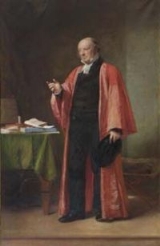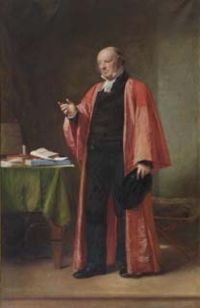
Robert Inglis
Encyclopedia

England
England is a country that is part of the United Kingdom. It shares land borders with Scotland to the north and Wales to the west; the Irish Sea is to the north west, the Celtic Sea to the south west, with the North Sea to the east and the English Channel to the south separating it from continental...
Conservative
Conservative Party (UK)
The Conservative Party, formally the Conservative and Unionist Party, is a centre-right political party in the United Kingdom that adheres to the philosophies of conservatism and British unionism. It is the largest political party in the UK, and is currently the largest single party in the House...
politician
Politician
A politician, political leader, or political figure is an individual who is involved in influencing public policy and decision making...
, noted for his staunch High church
High church
The term "High Church" refers to beliefs and practices of ecclesiology, liturgy and theology, generally with an emphasis on formality, and resistance to "modernization." Although used in connection with various Christian traditions, the term has traditionally been principally associated with the...
views.
He was the son of Sir Hugh Inglis
Sir Hugh Inglis, 1st Baronet
Sir Hugh Inglis, 1st Baronet was an East Indies merchant and politician.Inglis went to the East Indies in 1762, and returned in 1775. He was chosen as a Director of the East India Company in 1784, where he served as deputy-chairman in 1796 to 1797 and 1799-1800 and chairman in 1797 to 1798 and...
, a minor politician and MP
Member of Parliament
A Member of Parliament is a representative of the voters to a :parliament. In many countries with bicameral parliaments, the term applies specifically to members of the lower house, as upper houses often have a different title, such as senate, and thus also have different titles for its members,...
for Ashburton
Ashburton (UK Parliament constituency)
Ashburton was a borough constituency represented in the House of Commons of the Parliament at Westminster, for one Parliament in 1298 and regularly from 1640 until it was abolished for the 1868 general election. It was one of three Devon borough constituencies newly enfranchised in the Long...
(1802–1806). Robert, who succeeded to his father's baronet
Baronet
A baronet or the rare female equivalent, a baronetess , is the holder of a hereditary baronetcy awarded by the British Crown...
cy in 1820, was MP for Dundalk
Dundalk (UK Parliament constituency)
Dundalk was a parliamentary borough constituency in Ireland, which returned one Member of Parliament to the House of Commons of the Parliament of the United Kingdom...
1824-1826, Ripon
Ripon (UK Parliament constituency)
Ripon was a constituency sending members to the House of Commons of the Parliament of the United Kingdom until 1983, centred on the city of Ripon in North Yorkshire.-History:...
1828-1829 and Oxford University
Oxford University (UK Parliament constituency)
Oxford University was a university constituency electing two members to the British House of Commons, from 1603 to 1950.-Boundaries, Electorate and Electoral System:...
from 1829 to 1854. He was appointed High Sheriff of Bedfordshire
High Sheriff of Bedfordshire
-1066–1125:*1066-c.1084: Ansculf de Picquigny*Ralph Taillebois*Hugh de Belcamp*1124 Richard of WinchesterFrom 1125 through the end of 1575, appointees to the shrievalty held the joint office of High Sheriff of Bedfordshire and Buckinghamshire.-1575–1599:...
for 1824.
Inglis was strongly opposed to measures which, in his view, weakened the Anglican Church. When Robert Grant
Robert Grant (MP)
Sir Robert Grant GCH was a British lawyer and politician.He was born in India, the son of Charles Grant, chairman of the Directors of the Honourable East India Company, and younger brother of Charles Grant, later Lord Glenelg. Returning home with their father in 1790, the two brothers were entered...
, MP for Inverness Burghs (UK Parliament constituency)
Inverness Burghs (UK Parliament constituency)
Inverness Burghs was a district of burghs constituency of the House of Commons of the Parliament of Great Britain from 1708 to 1801 and of the Parliament of the United Kingdom from 1801 to 1918...
, petitioned for Jewish relief in 1830, Inglis was violently opposed. Inglis alleged that the Jews were an alien people, with no allegiance to England, and that to admit Jews to parliament would "separate Christianity itself from the State." He also alleged that if they were admitted to parliament "within seven years...Parliamentary Reform would be carried." Inglis was joined in his public opposition by the Chancellor of the Exchequer
Chancellor of the Exchequer
The Chancellor of the Exchequer is the title held by the British Cabinet minister who is responsible for all economic and financial matters. Often simply called the Chancellor, the office-holder controls HM Treasury and plays a role akin to the posts of Minister of Finance or Secretary of the...
, Henry Goulburn
Henry Goulburn
Henry Goulburn PC FRS was an English Conservative statesman and a member of the Peelite faction after 1846.-Background and education:...
, and the Solicitor General
Solicitor General for England and Wales
Her Majesty's Solicitor General for England and Wales, often known as the Solicitor General, is one of the Law Officers of the Crown, and the deputy of the Attorney General, whose duty is to advise the Crown and Cabinet on the law...
and future Lord Chancellor
Lord Chancellor
The Lord High Chancellor of Great Britain, or Lord Chancellor, is a senior and important functionary in the government of the United Kingdom. He is the second highest ranking of the Great Officers of State, ranking only after the Lord High Steward. The Lord Chancellor is appointed by the Sovereign...
, Sir Edward Sugden
Edward Sugden, 1st Baron St Leonards
Edward Burtenshaw Sugden, 1st Baron St Leonards PC was a British lawyer, judge and Conservative politician.-Background:St Leonards was the son of a high-class hairdresser and wig-maker in Westminster, London....
. Although the Jews were not emancipated fully until 1858, Parliamentary Reform occurred in 1832, just two years later. Inglis also likened Buddhism
Buddhism
Buddhism is a religion and philosophy encompassing a variety of traditions, beliefs and practices, largely based on teachings attributed to Siddhartha Gautama, commonly known as the Buddha . The Buddha lived and taught in the northeastern Indian subcontinent some time between the 6th and 4th...
to "idolatry
Idolatry
Idolatry is a pejorative term for the worship of an idol, a physical object such as a cult image, as a god, or practices believed to verge on worship, such as giving undue honour and regard to created forms other than God. In all the Abrahamic religions idolatry is strongly forbidden, although...
" in connection with the British colony of Ceylon during a debate over the relationship of "Buddhist priests" to the British colonial government in 1852.
In 1845 he broke with Sir Robert Peel
Robert Peel
Sir Robert Peel, 2nd Baronet was a British Conservative statesman who served as Prime Minister of the United Kingdom from 10 December 1834 to 8 April 1835, and again from 30 August 1841 to 29 June 1846...
and opposed the Maynooth Grant
Maynooth Grant
The Maynooth Grant was a major British political controversy of the 1840s which arose partly due to the general anti-Irish and anti-Catholic feelings of the British population....
, which would have granted a yearly £
Pound sterling
The pound sterling , commonly called the pound, is the official currency of the United Kingdom, its Crown Dependencies and the British Overseas Territories of South Georgia and the South Sandwich Islands, British Antarctic Territory and Tristan da Cunha. It is subdivided into 100 pence...
26,000 subsidy to the Catholic Maynooth seminary
St Patrick's College, Maynooth
St Patrick's College, Maynooth is the "National Seminary for Ireland" , and a Pontifical University, located in the village of Maynooth, 15 miles from Dublin, Ireland. The college and seminary are often referred to as Maynooth College. The college was officially established as the Royal College...
. Other opponents included, oddly enough, John Bright
John Bright
John Bright , Quaker, was a British Radical and Liberal statesman, associated with Richard Cobden in the formation of the Anti-Corn Law League. He was one of the greatest orators of his generation, and a strong critic of British foreign policy...
and Benjamin Disraeli, although on different grounds.
In 1851, when Lord Stanley
Edward Smith-Stanley, 14th Earl of Derby
Edward George Geoffrey Smith-Stanley, 14th Earl of Derby, KG, PC was an English statesman, three times Prime Minister of the United Kingdom, and to date the longest serving leader of the Conservative Party. He was known before 1834 as Edward Stanley, and from 1834 to 1851 as Lord Stanley...
(who became the Earl of Derby later that year) attempted to form a protectionist administration, Inglis was offered the presidency of the Board of Control
President of the Board of Control
The President of the Board of Control was a British government official in the late 18th and early 19th century responsible for overseeing the British East India Company and generally serving as the chief official in London responsible for Indian affairs. The position was frequently a cabinet...
, which he accepted initially, only to withdraw a few days later. A major activity of Inglis's political career was the chairing of the select committee that controlled the House of Commons Library
House of Commons Library
The House of Commons Library is the library and information resource of the lower house of the British Parliament. It has adopted the phrase "Contributing to a well-informed democracy" as a summary of its mission statement.- History :...
, of which he was a member for 14 years. However, his rather narrow view of its scope was overturned by Sir Robert Peel in 1850. He was made a Privy Counsellor in 1854, and died the next year, at the age of 69. On his death the baronetcy became extinct.
Inglis's Journals are in the Canterbury cathedral
Canterbury Cathedral
Canterbury Cathedral in Canterbury, Kent, is one of the oldest and most famous Christian structures in England and forms part of a World Heritage Site....
Library and archives.

